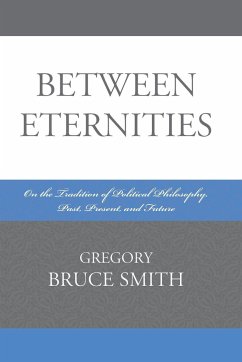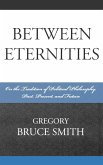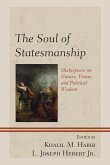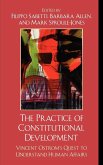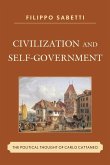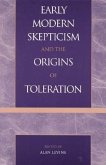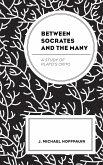- Broschiertes Buch
- Merkliste
- Auf die Merkliste
- Bewerten Bewerten
- Teilen
- Produkt teilen
- Produkterinnerung
- Produkterinnerung
Between Eternities deals with the future of the tradition of political philosophy. The author argues that this tradition can only progress after the postmodernist fragmentation of political philosophy has been realized as part of the grander scheme of the history of Western thought.
Andere Kunden interessierten sich auch für
![Between Eternities Between Eternities]() Gregory Bruce SmithBetween Eternities230,99 €
Gregory Bruce SmithBetween Eternities230,99 €![The Soul of Statesmanship The Soul of Statesmanship]() The Soul of Statesmanship53,99 €
The Soul of Statesmanship53,99 €![The Arts of Rule The Arts of Rule]() The Arts of Rule196,99 €
The Arts of Rule196,99 €![The Practice of Constitutional Development The Practice of Constitutional Development]() The Practice of Constitutional Development150,99 €
The Practice of Constitutional Development150,99 €![Civilization and Self-Government Civilization and Self-Government]() Filippo SabettiCivilization and Self-Government68,99 €
Filippo SabettiCivilization and Self-Government68,99 €![Early Modern Skepticism and the Origins of Toleration Early Modern Skepticism and the Origins of Toleration]() Alan LevineEarly Modern Skepticism and the Origins of Toleration149,99 €
Alan LevineEarly Modern Skepticism and the Origins of Toleration149,99 €![Between Socrates and the Many Between Socrates and the Many]() J. Michael HoffpauirBetween Socrates and the Many125,99 €
J. Michael HoffpauirBetween Socrates and the Many125,99 €-
-
-
Between Eternities deals with the future of the tradition of political philosophy. The author argues that this tradition can only progress after the postmodernist fragmentation of political philosophy has been realized as part of the grander scheme of the history of Western thought.
Hinweis: Dieser Artikel kann nur an eine deutsche Lieferadresse ausgeliefert werden.
Hinweis: Dieser Artikel kann nur an eine deutsche Lieferadresse ausgeliefert werden.
Produktdetails
- Produktdetails
- Verlag: Lexington Books
- Seitenzahl: 670
- Erscheinungstermin: 13. Mai 2008
- Englisch
- Abmessung: 229mm x 152mm x 36mm
- Gewicht: 954g
- ISBN-13: 9780739120774
- ISBN-10: 0739120778
- Artikelnr.: 23440437
- Herstellerkennzeichnung
- Libri GmbH
- Europaallee 1
- 36244 Bad Hersfeld
- gpsr@libri.de
- Verlag: Lexington Books
- Seitenzahl: 670
- Erscheinungstermin: 13. Mai 2008
- Englisch
- Abmessung: 229mm x 152mm x 36mm
- Gewicht: 954g
- ISBN-13: 9780739120774
- ISBN-10: 0739120778
- Artikelnr.: 23440437
- Herstellerkennzeichnung
- Libri GmbH
- Europaallee 1
- 36244 Bad Hersfeld
- gpsr@libri.de
By Gregory Bruce Smith
Chapter 1 Introduction: Political Philosophy; Is There a Future Tradition?
Part 2 Modern Constructivism or Phenomenology Chapter 3 Preface: Modernity
and Its Closure Chapter 4 The "End of History" or a Portal to the Future
Chapter 5 What is Political Philosophy: A Phenomenological Approach Chapter
6 Cacophony of Silence: Derrida's Deconstructionism and the Possibility of
Political Philosophy Chapter 7 Machiavelli's The Prince and the Essence of
Modernity Chapter 8 Phenomenology or Constructivism: Robert Pippin's
Modernity Part 9 Leo Strauss and the Tradition: An Engagement Chapter 10
Preface: Remembrance and Tradition Chapter 11 Who Was Leo Strauss? Chapter
12 Leo Strauss and the Straussians: An Anti-Democratic Cult? Chapter 13
Athens and Washington: Leo Strauss and the American Regime Chapter 14 On a
Possible Epicurean Garden for Philosophy Chapter 15 On Cropsey's World:
Joseph Cropsey and the Tradition of Political Philosophy Chapter 16 Between
Platonism and Postmodernism: Plato's Emendation of Socratism in the Trilogy
Chapter 17 Leo Strauss and Martin Heidegger Part 18 The Non-Metaphysical
Plato: Second Beginnings? Chapter 19 Preface: Plato, Platonism, and a
Second Beginning Chapter 20 Dialogue and Dialectic in Plato's Phaedo
Chapter 21 Political Philosophy and Eros: Plato's Socrates in the Symposium
Chapter 22 Plato's Parmenides: Socratism and the Origins of Platonic
Political Philosophy Chapter 23 Aristotle on Reason and Its Limits Part 24
Political Philosophy After Modernity? Chapter 25 Preface: Openings Toward
the Postmodern Chapter 26 Legitimacy, International Morality, and the
Postmodern Global Future Chapter 27 Jerusalem and Washington: Political
Philosophy and Theology Chapter 28 Ontology, Technology, Poetry, or
Mandarin Pastime? Chapter 29 The Queen of the Sciences: Political
Philosophy or Biology Chapter 30 Political Philosophy and Environmentalism:
Recovering the Phenomenon "Nature" Chapter 31 Conclusion: Is There a
Future?
Part 2 Modern Constructivism or Phenomenology Chapter 3 Preface: Modernity
and Its Closure Chapter 4 The "End of History" or a Portal to the Future
Chapter 5 What is Political Philosophy: A Phenomenological Approach Chapter
6 Cacophony of Silence: Derrida's Deconstructionism and the Possibility of
Political Philosophy Chapter 7 Machiavelli's The Prince and the Essence of
Modernity Chapter 8 Phenomenology or Constructivism: Robert Pippin's
Modernity Part 9 Leo Strauss and the Tradition: An Engagement Chapter 10
Preface: Remembrance and Tradition Chapter 11 Who Was Leo Strauss? Chapter
12 Leo Strauss and the Straussians: An Anti-Democratic Cult? Chapter 13
Athens and Washington: Leo Strauss and the American Regime Chapter 14 On a
Possible Epicurean Garden for Philosophy Chapter 15 On Cropsey's World:
Joseph Cropsey and the Tradition of Political Philosophy Chapter 16 Between
Platonism and Postmodernism: Plato's Emendation of Socratism in the Trilogy
Chapter 17 Leo Strauss and Martin Heidegger Part 18 The Non-Metaphysical
Plato: Second Beginnings? Chapter 19 Preface: Plato, Platonism, and a
Second Beginning Chapter 20 Dialogue and Dialectic in Plato's Phaedo
Chapter 21 Political Philosophy and Eros: Plato's Socrates in the Symposium
Chapter 22 Plato's Parmenides: Socratism and the Origins of Platonic
Political Philosophy Chapter 23 Aristotle on Reason and Its Limits Part 24
Political Philosophy After Modernity? Chapter 25 Preface: Openings Toward
the Postmodern Chapter 26 Legitimacy, International Morality, and the
Postmodern Global Future Chapter 27 Jerusalem and Washington: Political
Philosophy and Theology Chapter 28 Ontology, Technology, Poetry, or
Mandarin Pastime? Chapter 29 The Queen of the Sciences: Political
Philosophy or Biology Chapter 30 Political Philosophy and Environmentalism:
Recovering the Phenomenon "Nature" Chapter 31 Conclusion: Is There a
Future?
Chapter 1 Introduction: Political Philosophy; Is There a Future Tradition?
Part 2 Modern Constructivism or Phenomenology Chapter 3 Preface: Modernity
and Its Closure Chapter 4 The "End of History" or a Portal to the Future
Chapter 5 What is Political Philosophy: A Phenomenological Approach Chapter
6 Cacophony of Silence: Derrida's Deconstructionism and the Possibility of
Political Philosophy Chapter 7 Machiavelli's The Prince and the Essence of
Modernity Chapter 8 Phenomenology or Constructivism: Robert Pippin's
Modernity Part 9 Leo Strauss and the Tradition: An Engagement Chapter 10
Preface: Remembrance and Tradition Chapter 11 Who Was Leo Strauss? Chapter
12 Leo Strauss and the Straussians: An Anti-Democratic Cult? Chapter 13
Athens and Washington: Leo Strauss and the American Regime Chapter 14 On a
Possible Epicurean Garden for Philosophy Chapter 15 On Cropsey's World:
Joseph Cropsey and the Tradition of Political Philosophy Chapter 16 Between
Platonism and Postmodernism: Plato's Emendation of Socratism in the Trilogy
Chapter 17 Leo Strauss and Martin Heidegger Part 18 The Non-Metaphysical
Plato: Second Beginnings? Chapter 19 Preface: Plato, Platonism, and a
Second Beginning Chapter 20 Dialogue and Dialectic in Plato's Phaedo
Chapter 21 Political Philosophy and Eros: Plato's Socrates in the Symposium
Chapter 22 Plato's Parmenides: Socratism and the Origins of Platonic
Political Philosophy Chapter 23 Aristotle on Reason and Its Limits Part 24
Political Philosophy After Modernity? Chapter 25 Preface: Openings Toward
the Postmodern Chapter 26 Legitimacy, International Morality, and the
Postmodern Global Future Chapter 27 Jerusalem and Washington: Political
Philosophy and Theology Chapter 28 Ontology, Technology, Poetry, or
Mandarin Pastime? Chapter 29 The Queen of the Sciences: Political
Philosophy or Biology Chapter 30 Political Philosophy and Environmentalism:
Recovering the Phenomenon "Nature" Chapter 31 Conclusion: Is There a
Future?
Part 2 Modern Constructivism or Phenomenology Chapter 3 Preface: Modernity
and Its Closure Chapter 4 The "End of History" or a Portal to the Future
Chapter 5 What is Political Philosophy: A Phenomenological Approach Chapter
6 Cacophony of Silence: Derrida's Deconstructionism and the Possibility of
Political Philosophy Chapter 7 Machiavelli's The Prince and the Essence of
Modernity Chapter 8 Phenomenology or Constructivism: Robert Pippin's
Modernity Part 9 Leo Strauss and the Tradition: An Engagement Chapter 10
Preface: Remembrance and Tradition Chapter 11 Who Was Leo Strauss? Chapter
12 Leo Strauss and the Straussians: An Anti-Democratic Cult? Chapter 13
Athens and Washington: Leo Strauss and the American Regime Chapter 14 On a
Possible Epicurean Garden for Philosophy Chapter 15 On Cropsey's World:
Joseph Cropsey and the Tradition of Political Philosophy Chapter 16 Between
Platonism and Postmodernism: Plato's Emendation of Socratism in the Trilogy
Chapter 17 Leo Strauss and Martin Heidegger Part 18 The Non-Metaphysical
Plato: Second Beginnings? Chapter 19 Preface: Plato, Platonism, and a
Second Beginning Chapter 20 Dialogue and Dialectic in Plato's Phaedo
Chapter 21 Political Philosophy and Eros: Plato's Socrates in the Symposium
Chapter 22 Plato's Parmenides: Socratism and the Origins of Platonic
Political Philosophy Chapter 23 Aristotle on Reason and Its Limits Part 24
Political Philosophy After Modernity? Chapter 25 Preface: Openings Toward
the Postmodern Chapter 26 Legitimacy, International Morality, and the
Postmodern Global Future Chapter 27 Jerusalem and Washington: Political
Philosophy and Theology Chapter 28 Ontology, Technology, Poetry, or
Mandarin Pastime? Chapter 29 The Queen of the Sciences: Political
Philosophy or Biology Chapter 30 Political Philosophy and Environmentalism:
Recovering the Phenomenon "Nature" Chapter 31 Conclusion: Is There a
Future?

